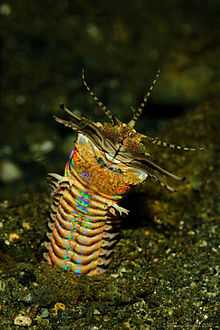Eunicida
From Wikipedia, the free encyclopedia
| Eunicida Temporal range: Ordovician–recent | |
|---|---|
 | |
| Eunice aphroditois | |
| Scientific classification | |
| Kingdom: | Animalia |
| Subkingdom: | Eumetazoa |
| Phylum: | Annelida |
| Class: | Polychaeta |
| Subclass: | Aciculata |
| Order: | Eunicida [1] |
| Families | |
|
| |
Eunicida is an order of polychaete worms.
Characteristics
Members of this order have an elongated, segmented body and a distinct head, normally with a separate peristomium and prostomium. Many, but not all, live in tubes which vary from a mucous sheath to a tough, horny casing. The palps vary from globular to cylindrical and there are from 0 to 7 antennae, usually smooth but occasionally jointed. There is a muscular pharynx with a dorsal pair of mandibles and a set of ventral, toothed, maxillary plates. Some species have tentacular cirri and all have unbranched parrapodia. In some species dorsal cirri, branchiae, ventral cirri and chaetae occur, but not in others.[2]
Families
The World Register of Marine Species includes the following families in the order:[1]
References
- ↑ 1.0 1.1 Read, Geoff (2010). "Eunicida". In G. Read & K. Fauchald. World Polychaeta database. World Register of Marine Species. Retrieved 2012-01-17.
- ↑ Eunicida Natural History Museum. Retrieved 2012-01-17.
| Wikispecies has information related to: Eunicida |
This article is issued from Wikipedia. The text is available under the Creative Commons Attribution/Share Alike; additional terms may apply for the media files.